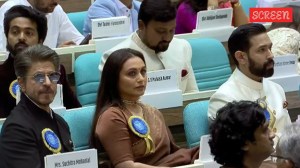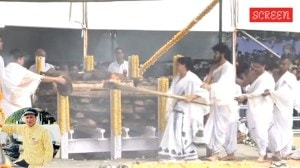‘Foreign hand won’t wield a magic stick’
A HOT Singapore afternoon, a big glass of lemon iced tea and a conversation with Jude Felix. When it’s the Arjuna awardee hockey Olympi...

A HOT Singapore afternoon, a big glass of lemon iced tea and a conversation with Jude Felix. When it’s the Arjuna awardee hockey Olympian you are talking to, it’s more than just the ice tea that is refreshing. As he sips his mug of hot teh tarek at a stall outside the Ang Mo Kio MRT rail station, on his way to St Nicholas Girls School as coach, the former centre half catches your questions cleanly and drives the point straight home. ‘‘Coaching plays only a small part in the development of hockey,’’ he says of the game in India. ‘‘Seventy-five per cent of the onus lies on a strong administration, one that is devoid of politics,’’ the emphasis is obvious. KPS Gill, Indian Hockey Federation (IHF) chief, may have recently said that the IHF would hire the services of a foreign coach to improve the standard of hockey in the country, but Felix wonders how far the move would work.
‘‘There has been so much talk of a foreign coach for too long now, so I guess we better wait and see. Anyway, a foreign coach will help only if the players respect and follow instructions. Having known the attitude of the Indian players, I feel it won’t work. They have always had this tag of former eight-time Olympic winners, so it will be difficult.’’
Felix is in Singapore since June 2001 as sports coordinator and coach of the Singapore Recreation Club (SRC). This is his second stint here, earlier he was a coach with the SRC in 1995-97. The first Indian to represent a hockey club in the European Cup as coach of the Racing Club de France at Paris from 1997-2001, Felix is also member of the International Hockey Federation (FIH) athletes panel.
Would he, with his vast experience as both player and coach, be willing to coach the Indian team? ‘‘Well, no one can assure things will change overnight, but I have the vision to surely make a difference and, with proper support, could achieve top three position,’’ comes the reply.
‘‘The administrators asked me four times in the past but never got back with any concrete proposal,’’ he recalls. ‘‘This is a profession, why aren’t terms and conditions clearly spelt out and proper contracts drawn?’’, the 38-year-old asks.
‘‘Playing for India was the ultimate (achievement),’’ says Felix, who took up the hockey stick at the age of nine and has played 250 international matches. ‘‘I dreamt of hockey all day, all night, it was sheer hard work.’’ From 1983, when he first joined the Indian team, to 1988, Felix was the only player from the southern part of the country in the national team. He represented the country in two Olympics, two Asian Games, two World Cup and three Champions Trophy tournaments and was the first Indian player to play professionally for a foreign club— F C Lyon, in the early ’90s. But being nominated for the Arjuna Award is the ultimate reward for him. Felix, not only kept his place in the national team for a record 12 successive years but also captained the side for two years, during the 1994 World Cup in Sydney. ‘‘But now that these (awards) have been tainted by politics, I don’t value them anymore,’’ says the sportsman who was once named by the FIH as one of the seven best players in the world.
Another thing that saddens him is the public attitude to hockey. ‘‘I am not jealous of cricket but I feel sad for the Indian public. It’s not educated enough to be able to chose which sport to support. In Holland, soccer may be the No. 1 sport but hockey still has public support because people are aware that their hockey team is among the top teams in the world. Whereas we are today among the top six but, you will still find TV coverage of a Ranji cricket match while an international hockey match gets unnoticed,’’ he points out.
The former Indian captain says that during his era, the players loved the game even though there hardly existed any facilities. ‘‘We played because we loved the game. We had to play under some of the worst facilities in the world,’’ says Felix.
Talking about his idols, Felix says that he looked up to veterans Govinda and Surjeet Singh. He also rates the Dutch player Ties Kruize very highly, along with former Indian captain in the 1984 World Cup, Mohammed Shahid. Among the current players, Feliz says that aging striker Dhanraj Pillay still takes the top slot. ‘‘He is the best in the world today,’’ says Felix.
Photos



- 01
- 02
- 03
- 04
- 05




























